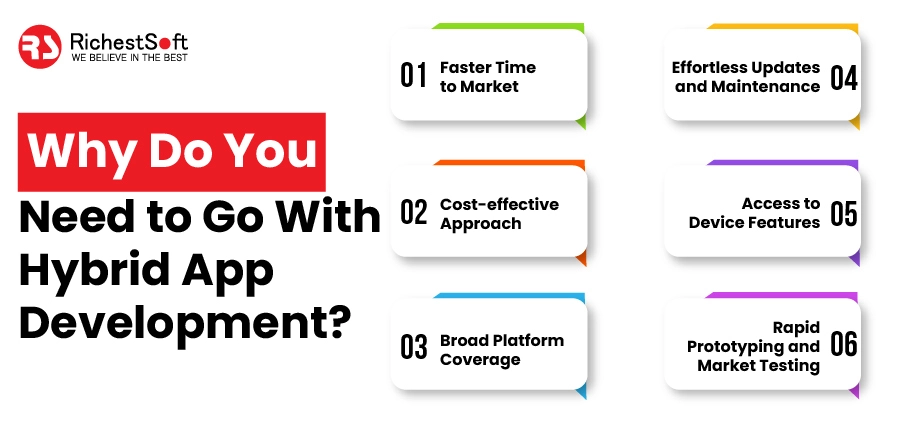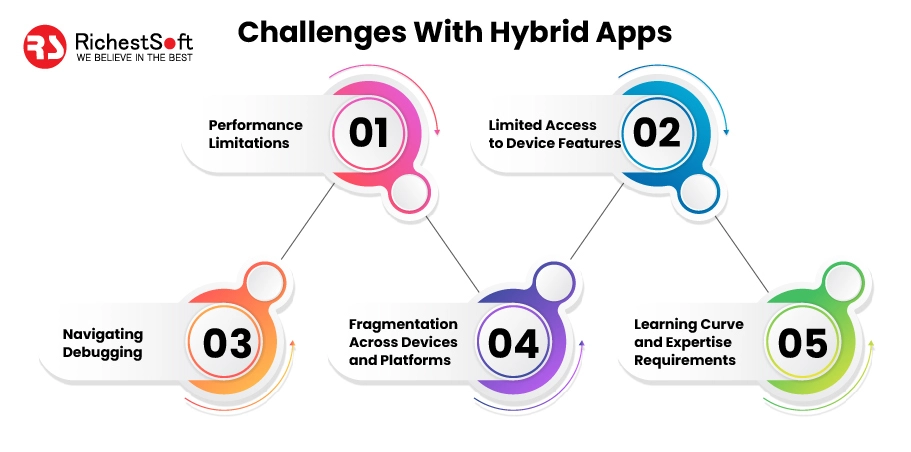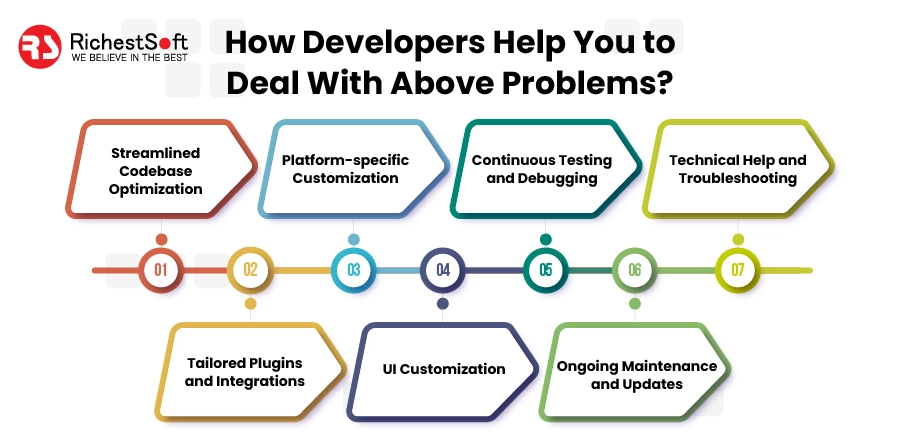Introduction
Hybrid app development has emerged as a popular choice among developers due to its ability to blend native seamlessly and web app development approaches. It provides customers with flexible, cross-platform software and a cost-effective and successful solution. Mobile applications are now essential for businesses to interact with clients and broaden their reach in the digital environment.
- Developers must choose the best development strategy to produce effective, superior products as the need for mobile applications rises. Hybrid app development has quickly gained traction as one such approach.
- By combining online tools like CSS, HTML, and JavaScript with native capabilities, creating hybrid applications helps developers create apps that can be deployed across various platforms, such as iOS, Android, and the Internet. This tactic offers both programmers and users a plethora of benefits.
- You will thoroughly grasp the advantages of developing hybrid applications by the conclusion of this article, the reasons developers choose the Ionic structure, and the crucial role programmers play in conquering challenges to produce successful and efficient hybrid apps.
Whether you are a client trying to understand the benefits of this strategy or a developer looking for knowledge about hybrid app creation, you will receive helpful knowledge from this post to help you make wise choices and realize every potential of your smartphone application initiatives.
Why Do Developers Choose a Hybrid Platform?

✅Seamless cross-platform compatibility:
One compelling factor that attracts developers to hybrid app development is its ability to create a single codebase that runs seamlessly across multiple platforms, including iOS and Android. This approach saves considerable time and reduces effort compared to building separate native apps for each platform.
✅Cost efficiency:
Hybrid app development offers a cost-effective solution by significantly reducing development expenses. By eliminating the need to develop and maintain separate codebases for each platform, developers can deliver applications more efficiently and at a lower cost. This streamlined approach allows businesses to optimize resources and strategically allocate their budgets.
✅Easy maintenance and updates:
Since hybrid apps have a single codebase, updates, and bug fixes can be implemented more efficiently. Developers can change the codebase once, and the updates will be reflected across all platforms, ensuring consistency and reducing maintenance efforts.
Developers Choose Ionic Framework Because of the Below Reasons

The Ionic framework has emerged as a favored choice among developers for hybrid app development, and its popularity can be attributed to several key factors:
👉Rich UI components, including buttons, paperwork, menus, and navigational elements, are available to programmers with Ionic. Developers can create changing, aesthetically beautiful applications quickly and simply with these pre-built elements. It accelerates development and enhances the user experience all around.
👉Built on top of the famous Angular JavaScript structure, Ionic connects with Angular without hiccups, providing developers access to a rich set of tools and app frameworks for creating hybrid apps. Developers can leverage the extensive features and ecosystem of Angular to streamline the development process and build robust applications.
👉Native-like performance: Using technologies such as Cordova and Capacitor, Ionic enables access to native device features and APIs. This integration empowers hybrid apps developed with Ionic to deliver comparable performance to native applications. Users can enjoy a seamless and fluid experience, bridging the gap between native and web apps.
👉Extensive plugin ecosystem: Ionic boasts a comprehensive plugin ecosystem encompassing many functionalities and integrations. Plugins for services like push alerts, social networking communication, analytics, and more are simple to find and incorporate for developers. This extensive ecosystem of plugins removes the requirement for reinventing the wheel. It drastically cuts down on production labor and time, allowing developers to concentrate on the fundamental features of their apps.
👉Developer-friendly community and support: The Ionic framework has a well-built and active developer community. This community provides support, shares knowledge, and contributes to the growth of the framework. Developers can seek assistance, find code snippets, and participate in forums and communities dedicated to Ionic development. This collaborative environment fosters learning and problem-solving, making it easier for developers to adopt and excel in Ionic app development.
👉Hybrid app performance optimizations: Ionic offers various performance optimizations to enhance the speed and efficiency of hybrid apps. It utilizes techniques like Ahead-of-Time (AOT) compilation, lazy loading of modules, and efficient memory management to improve app performance. These optimizations ensure that hybrid apps built with Ionic can deliver smooth and responsive experiences to users, rivaling the performance of native apps.
Why Do You Need to Go With Hybrid App Development?

✔️Faster time to market:
Hybrid app development enables quicker deployment across multiple platforms. Developers may simultaneously promote both platforms with one codebase, reducing production time and allowing them to connect with their intended consumers more quickly.
✔️Cost-effective approach:
By doing away with the requirement for different native team developers for all platforms, hybrid apps dramatically lower development expenses. Businesses can save on resources while providing consistent user experience across different devices.
✔️Broad platform coverage:
Hybrid apps are not limited to specific platforms. They can function on various operating structures, notably internet browsers, Android, and Android phones. This broad platform coverage ensures wider market reach and maximizes the app’s potential user base. Hybrid apps ensure a consistent user experience across diverse platforms. By implementing responsive design principles and adapting to different screen sizes and resolutions, hybrid apps deliver a seamless and harmonious user experience, regardless of the device used. This meticulous attention to detail ensures that your app remains visually appealing and fully functional across iOS, Android, and web platforms.
✔️Effortless updates and maintenance:
Hybrid apps simplify the process of updates and maintenance. With a unified codebase, developers can make changes and implement updates in one central location, allowing the modifications to propagate seamlessly across all supported platforms. This streamlined approach enables swift implementation of bug fixes, feature enhancements, and security patches, leading to efficient maintenance. Furthermore, users can effortlessly receive updates, resulting in an enhanced overall experience with the app.
✔️Access to device features:
Hybrid apps leverage native features and APIs by integrating plugins and frameworks. It allows developers to harness various capabilities, including camera access, GPS functionality, contact management, and push notifications. Hybrid apps offer users a rich and interactive experience by seamlessly integrating these features. With the continual advancements in hybrid app frameworks, the availability of plugins for accessing device features has expanded, mitigating the limitations traditionally associated with hybrid app development.
✔️Rapid prototyping and market testing:
Hybrid app development enables businesses to construct functional prototypes and deploy them across multiple platforms swiftly. This iterative approach gathers valuable user feedback and validates concepts before committing to full-scale development. By obtaining early user insights, businesses can minimize risks and reduce costs associated with launching a new app. This efficient process ensures that the final product is aligned with user expectations and maximizes the chances of success in the market.
Challenges With Hybrid Apps

While hybrid app development offers numerous advantages, it also comes with specific challenges:
✔️Performance limitations:
Hybrid apps may face performance issues compared to fully native apps, especially in graphics-intensive applications or those requiring complex calculations. However, advancements in hybrid frameworks and improved device capabilities minimize this gap.
✔️Limited access to device features:
Hybrid apps rely on plugins to access certain features; not all native functionalities may be available. However, the availability of plugins is increasing, and developers can often find suitable solutions to meet their app’s requirements.
Hybrid apps often strive to deliver a consistent user experience across platforms, but there might still be subtle differences in the look and feel compared to fully native apps.
Platform-specific UI guidelines and interactions can present challenges when aiming for a seamless experience across different operating systems. Developers must carefully implement platform-specific customizations to ensure the app feels native on each platform while maintaining a cohesive brand identity.
✔️Navigating debugging and troubleshooting complexities:
Hybrid app development presents unique challenges when it comes to debugging and troubleshooting. The amalgamation of HTML, CSS, and JavaScript, along with the interaction between web code and native code, can introduce complexities that require careful attention.
Pinpointing and resolving issues can be demanding, requiring developers to possess proficiency in debugging tools and techniques tailored to hybrid app development. By mastering these skills, developers can effectively identify and address any bugs or performance bottlenecks, ensuring the smooth functioning of the hybrid app.
✔️Fragmentation across devices and platforms:
The mobile landscape is highly fragmented, with numerous device models, screen sizes, and operating system versions. Ensuring consistent performance and appearance across this diverse range of devices can be challenging for hybrid apps. Thorough testing on various devices and operating system versions are crucial to identify and address any compatibility issues that may arise.
✔️Learning curve and expertise requirements:
Hybrid app development typically involves knowledge of web technologies, hybrid frameworks, and native integrations. Developers need to possess skills in web development, JavaScript and familiarity with hybrid frameworks like Ionic, React Native, or Flutter. Acquiring and mastering these skills may require a learning curve and ongoing professional development to stay updated with the latest advancements in hybrid app development.
While hybrid app development offers a balance between cross-platform compatibility and development efficiency, these challenges need to be acknowledged and addressed by skilled developers. Overcoming these obstacles requires expertise, careful planning, and diligent execution to ensure the successful development and deployment of hybrid apps that meet both developer and client expectations.
How Developers Help You to Deal With Above Problems?

✅Streamlined codebase optimization:
Seasoned developers possess the expertise to optimize the codebase by implementing best practices and leveraging performance optimization techniques. They can pinpoint bottlenecks and optimize the app’s functionality through meticulous study to guarantee a fluid and fast user interface. Developers can increase the effectiveness of the hybrid application and boost its overall efficiency by streamlining the coding.
✅Tailored plugins and integrations:
Developers can create customized plugins or utilize existing ones to seamlessly integrate native device features that may not be readily available in hybrid frameworks. This flexibility allows for incorporating specific functionalities and enhances the app’s capabilities. By leveraging these custom plugins and integrations, developers can provide users with a rich and interactive experience that leverages the full potential of the underlying device capabilities. It ensures that the app can offer the desired functionality without compromising performance.
✅Platform-specific customization:
To address user experience disparities, developers can tailor the app’s UI and interactions to each platform’s design guidelines. This customization ensures the app feels native to users on different devices while maintaining a unified brand identity.
✅UI customization:
Developers can tailor the hybrid app’s user interface (UI) and user experience (UX) to each platform’s design guidelines. They understand the intricacies of different operating systems and can adapt the app’s UI elements, interactions, and navigation to match the native look and feel. This customization ensures users on various platforms have a familiar and intuitive experience, improving engagement and satisfaction.
✅Continuous testing and debugging:
Developers employ rigorous testing methodologies to identify and rectify any issues or bugs that may arise during development. They conduct thorough testing across various gadgets and operating systems to ensure the app’s security and performance. Developers may proactively solve any possible issues by undertaking ongoing testing and troubleshooting, leading to an error-free and dependable app.
✅Ongoing maintenance and updates:
Developers assist in the continued maintenance and updates of hybrid apps. To handle changing user needs and shifting platform demands, they keep an eye on the performance of the apps, spot areas for enhancement, and roll out the appropriate upgrades. Additionally, they ensure that the application is still compatible with the most recent devices and operating structures, preventing compatibility problems and giving consumers a flawless experience.
✅Technical help and troubleshooting:
Developers offer prompt support and assistance in the event of any problems or technical issues. They can swiftly identify and fix problems that can occur while using the app due to their in-depth understanding of the application’s codebase.
Their expertise and prompt assistance help minimize downtime and ensure a smooth user experience.
FAQs
Q1: Are hybrid apps suitable for all types of applications?
Ans: Commercial applications, online stores, networking sites, and utility programs are just a few of the many uses for hybrid apps. However, complex 3D games or highly specialized applications may benefit more from native development.
Q2: Can hybrid apps access device-specific features?
Ans: Yes, hybrid apps can access device-specific features through plugins or frameworks like Cordova and Capacitor. These tools provide access to native APIs, allowing developers to utilize various device capabilities.
Q3: Are hybrid apps cost-effective in the long run?
Ans: In the long haul, hybrid apps save money because of lower creation and upkeep costs. Upgrades and bug fixes are simplified by managing one codebase across different platforms, eventually leading to cost benefits.
Q4: Can hybrid applications function on par with native ones?
Ans: The performance of hybrid apps has significantly improved over time. They can give near-native efficiency for most use cases, even though they might not always equal the efficiency of completely native apps. Skilled developers can optimize the app’s code and leverage native device capabilities to enhance performance.
Q5: Are hybrid apps suitable for offline functionality?
Ans: Yes, hybrid apps can incorporate offline functionality. Using techniques like caching and local storage, developers can ensure that certain features and content remain accessible even when the device is offline. Hybrid frameworks often provide built-in support for offline capabilities, making it easier to implement offline functionality.
Q6: How easy is it to maintain and update hybrid apps?
Ans: Hybrid apps are relatively easy to maintain and update. With a single codebase, developers can make updates and bug fixes that reflect across all platforms simultaneously. This streamlined process saves time and effort compared to managing separate codebases for each forum, ensuring consistent updates across all devices.
Q7: Can existing web applications be converted into hybrid apps?
Ans: Yes, existing web applications can be converted into hybrid apps. With frameworks like Ionic, developers can leverage the existing web technologies and codebase to build a hybrid app that can be distributed through app stores. It allows businesses to expand their reach by offering a native-like experience to users while utilizing their existing web assets.
Conclusion
Hybrid app development offers numerous benefits for both developers and clients. Developers choose hybrid platforms for their cross-platform compatibility and cost-effectiveness. The Ionic framework further enhances the development process with its rich UI components and seamless integration with Angular.
Clients benefit from faster time to market, cost-effective solutions, and broader platform coverage. Although hybrid apps may face challenges, skilled app developers can overcome them by optimizing the codebase, utilizing custom plugins, and providing platform-specific customization. By harnessing the power of hybrid app development, businesses can create versatile and efficient applications that cater to a wide range of users.
 +1 315 210 4488
+1 315 210 4488 +91 798 618 8377
+91 798 618 8377


